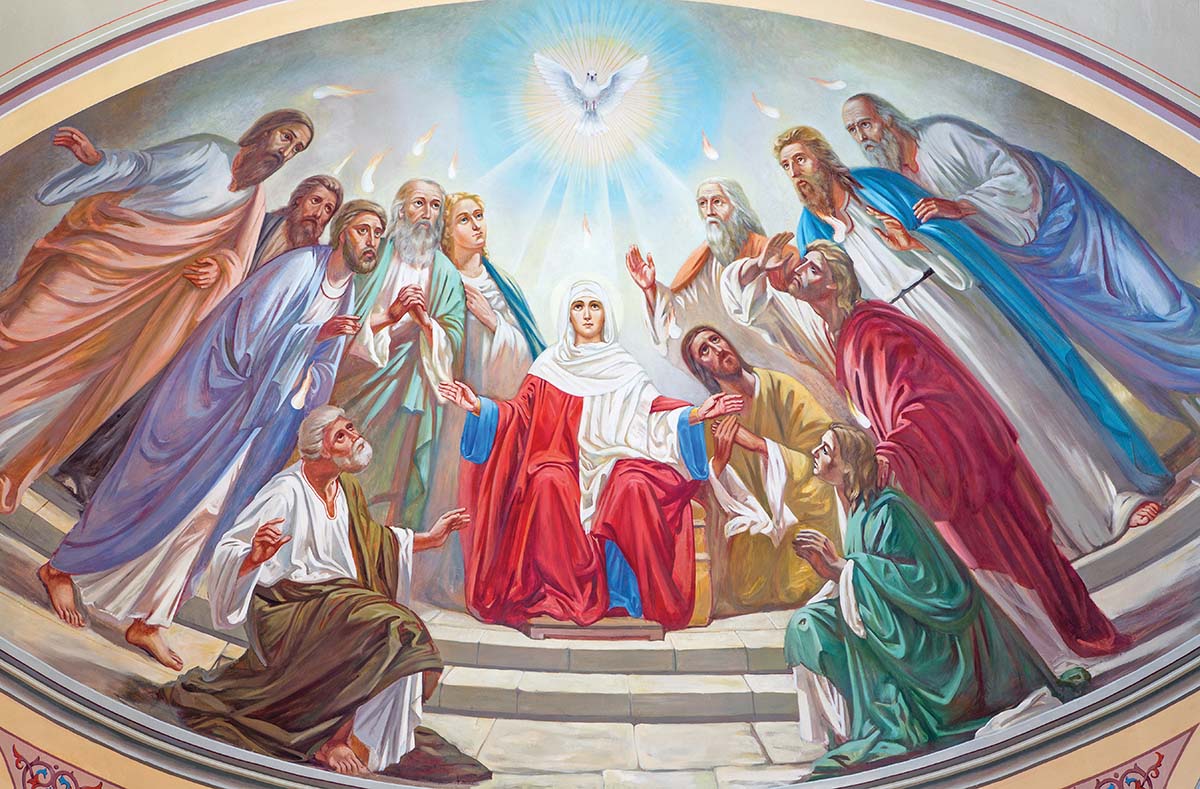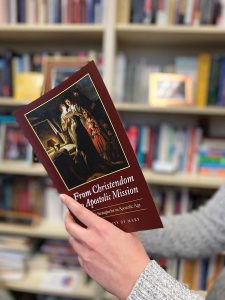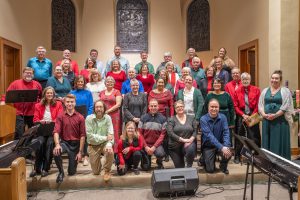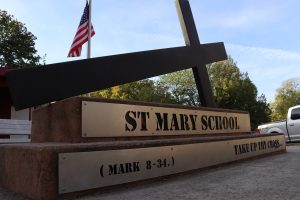
JERUSALEM, ISRAEL - MARCH 5 , 2015: The Pentecost scene. Fresco from 20. cent. in the side apse of Russian orthodox cathedral of Holy Trinity in the Russian Compound.
By Renae Kranz

The first generations of Christians, led by the Apostles, faced an enormous challenge after Pentecost: convert to Christianity a world hostile to the good news of Christ’s resurrection and the gift of salvation. They faced great persecution and even death, but their work and the perseverance of many generations after them built a Christian culture that has survived for centuries. This was a culture built on the foundations of Christian faith and Catholic institutions that made practicing faith a natural part of life.
That Christian culture, known as Christendom, is now gone.
In the early ’70s, Archbishop Fulton Sheen said of the state of Christianity, “We are at the end of Christendom. Not of Christianity, not of the Church, but of Christendom. Now what is meant by Christendom? Christendom is economic, political, social life as inspired by Christian principles. That is ending—we’ve seen it die.”
That sounds really bad, doesn’t it? But Archbishop Sheen assured us this was not all bad news.
“These are great and wonderful days in which to be alive. … It is not a gloomy picture—it is a picture of the Church in the midst of increasing opposition from the world. And therefore live your lives in full consciousness of this hour of testing, and rally close to the heart of Christ.”
Bishop Donald DeGrood wants to help us understand where we stand in our culture today, how to live as Catholics within it, and even how to grow the Church in the midst of opposition. And it’s all tied into his vision of Lifelong Catholic Missionary Discipleship Through God’s Love.
A new initiative
With the bishop’s wonderful vision in mind, he has tasked both Father Scott Traynor and Dr. Chris Burgwald to head up a new initiative to help lay and ordained alike understand where we are now and where we need to go as Catholics. It all starts with the help of an insightful book, “From Christendom to Apostolic Mission: Pastoral Strategies for an Apostolic Age” from the University of Mary.
“I was fortunate that someone recommended this book to me,” Bishop DeGrood said. “When I read it, I was impacted by the significant insights it offered to help me understand more fully what happened to the world, our country and our church related to losing such great moral and spiritual values as a culture.”
The bishop says he had some sense about what was happening in the world and the Church, but the book helped to clarify many things.
“As I read the book it was like a veil was lifted so I could see so much more clearly what was happening,” the bishop said. “The insights resonated in my heart as I pondered and prayed on them. My heart was lit on fire with an ‘aha, now I see’ moment of understanding. I am now motivated to change how I approach the challenges we face in our culture and my ministry as a bishop.”
To start this initiative, Bishop DeGrood has sent a copy of this book to all priests, deacons, seminarians and religious, as well as all parish and school staff members and staff at the Chancery. This group has been invited to go through a book study during Advent and the first part of the new year in order to get a good handle on what the bishop wants us all to learn from this book.
Bishop has invited parishes to consider offering a study of the book for their parishioners. To help parishes facilitate this effort, bulk book orders will be made available to parishes along with short video overviews of each chapter featuring Father Scott and Dr. Burgwald. Small group conversations will be encouraged, but individual study can also be done.
Why now?
In light of the bishop’s vision, we need to align everything in the diocese so every parish and school, every Catholic group and family is all about Lifelong Catholic Missionary Discipleship Through God’s Love and can contribute to growing the Church, even in a time when we live in a secular culture that is trying to reduce the Church’s influence. The goal is to help everyone get to heaven by living our lives according to God’s will and plan for each of us.
Father Scott describes Christendom as a time when even if people were very passive about their faith, the culture led them naturally toward God and the Church. You could be like a stick floating downstream and still find God. In the secular culture we now find ourselves in, if you just go along with the flow and the culture, you will be led away from Christ and the Church.
This applies directly to parish life, according to Father Scott. He says if we keep assuming the passive things we do will attract others to the Church, we will continue to see a decline in our parish families and in those seeking God. It’s the reason Bishop DeGrood has created his vision for us. He wants to help as many people as possible receive God’s love, and this book is a good way to start this new path of deepening friendship with God by understanding the cultural influences of our day.
“The book is really important because we’re living in a different cultural situation today, and this initiative of lifelong Catholic missionary discipleship is a response to that new cultural situation,” Father Scott says. “So the more people can understand what’s at stake in this cultural shift, the more they’ll understand the importance of pursuing the vision the bishop has placed before us.”
The challenge of living as a Catholic in a secular culture can be a little frightening. But Father Scott points out there are real opportunities for followers of Christ in this time. And if we know what the challenges will be, we can be prepared to face them effectively.
Up to the challenge
Remember the stick I talked about earlier, floating downstream? Our challenge is to not be that dead stick. Instead, Father Scott says we must be actively swimming upstream, against the current of our secular society. And while we’re swimming, we should be on fire for Christ.
 “It has always been important to live our faith deeply in an integral way and in a fruitful way. It’s what we’re called to do,” he says. “Jesus desires that we would live in intimate and unceasing communion of love with Him, that it would no longer be we who live, but He who lives in us. This is always the call and invitation of Christ and His Church, to live in relationship with God, to live our faith. That’s always important because salvation is on the line. The way I choose to live today has eternal consequences. So it’s more important for us to be more integrally alive in our faith so we don’t get swept away by the culture.”
“It has always been important to live our faith deeply in an integral way and in a fruitful way. It’s what we’re called to do,” he says. “Jesus desires that we would live in intimate and unceasing communion of love with Him, that it would no longer be we who live, but He who lives in us. This is always the call and invitation of Christ and His Church, to live in relationship with God, to live our faith. That’s always important because salvation is on the line. The way I choose to live today has eternal consequences. So it’s more important for us to be more integrally alive in our faith so we don’t get swept away by the culture.”
We have to make an intentional effort to grow in our relationship with God and help others do the same thing, but Father Scott reminds us it must be done with love. We have to be careful in this challenging time to not become judgmental or condemning in our actions toward others, and then remember that God has a gift He wants for every person.
“In love for them, I want what’s best for them, too,” Father Scott says. “That’s our call as disciples of Jesus Christ. Every person I meet is a battleground. No person I meet is the enemy. That’s really important in God’s love.”
Keep the right mindset
With all this opportunity and need to help grow the Church, the very body of Christ, we may feel some frustration when things aren’t happening as quickly as we would like. Living the bishop’s vision will be a real challenge and is a long-term effort. The Apostles didn’t convert the world overnight. Father Scott and the bishop want us to remember we aren’t alone in this fight for souls.
“It’s really important to understand that in all things, it’s God who does the heavy lifting. None of us, no matter how passionate we are or how deeply we believe, can change the hearts and minds of another human being,” Father Scott emphasizes. “What we can do is engage relationally with them to create a favorable environment in the way that we interact with them to receive that grace they can only receive from God.
“When I’m letting him do the heavy lifting, I’m not trying to be God. I’m letting God be God, but I’m ready to say. ‘Here I am, Lord. Send me.’ There’s always joy and ease and peace.”
Father Scott thinks this book and initiative will be encouraging and comforting to the average Catholic and will give them the language they need to understand why it feels more challenging to live their faith today.
As for Bishop DeGrood, he just wants us to receive God’s love and share it with others. “My hope and prayer is that many people will read the book and see the cultural challenges we find ourselves in. If we call upon God to bless us with the graces of the Apostolic Age, we will be happier than we ever have been in the past because we are saying to God, ‘Fill me with your life and love and then watch what happens.’”


